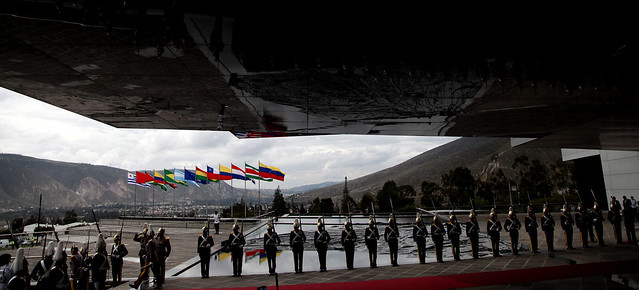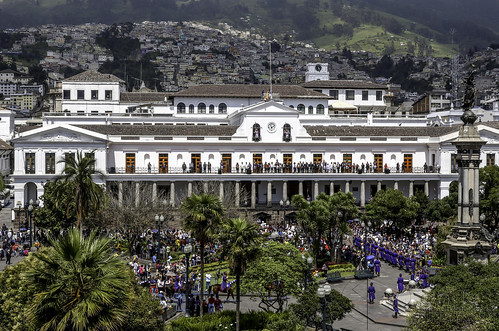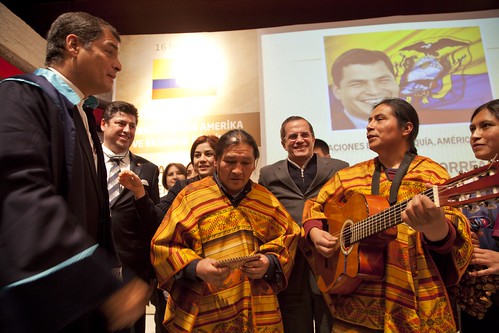Government and Politics of Ecuador: Presidential Elections 2017

"Bandera del Ecuador - Ecuador's flag" by Yamil Salinas Martínez is licensed under CC BY-SA
The History of Politics in Ecuador
The modern political system of Ecuador can be traced back to 1820, the year when the city of Guayaquil first declared independence from Spain. May 24, 1822 is the official date of Ecuador’s Independence. In 1830, Ecuador broke off from Gran Colombia, a state that included parts of modern day Peru, Colombia, Venezuela, Ecuador, Panama, Guyana, and Brazil, essentially the northwest corner of South America. When Ecuador broke away from Gran Colombia, it also created its first Constitution in the year 1830. Since then, the country has had 20 constitutions, 86 governments (sometimes under military rule) and 43 presidents. The country has had a number of political and economic shifts, including the transition from the Sucre to the American dollar in 2000. In 2007, following a tumultuous period of presidential instability, Rafael Correa was elected the 43rd president of Ecuador. He will be the president until May 2017. On April 2nd, the country will return to the voting booths to elect the next president of the country: Lenín Moreno of Alianza PAIS or Guillermo Lasso of CREO.
An Overview of the Political System

"INAUGURACIÓN DE LA NUEVA SEDE EN LA MITAD DEL MUNDO" by Cancillería Ecuador is licensed under CC BY-SA
There are three branches in the political system of Ecuador: the legislative, executive and judicial. The country is divided up into 24 provinces. Those provinces each have a capital and representatives. The provincial governors and councilors, like mayors and boards members, are elected directly. Quito, the capital of Ecuador, is also the capital of the Pichincha province. Of the 16 million people who live in Ecuador, there are 2.67 million inhabitants in Quito; the city has always been an important cultural, historical and commercial center. Recently, the population of Guayaquil surpassed that of Quito. Guayaquil is the capital of Guayas province and it now has 2.69 million inhabitants. It is the largest port city in the country. The 24 provinces are all divided into parroquias (parishes) and administrative cantones (counties). The provincial representatives are then elected to the National Assembly, the governing body of the Legislative Branch.
The Legislative Branch
The current president of the National Assembly is Gabriela Rivadeneira. One of her roles is to distribute proposals for new laws within the NA. The Legislative Branch has the power to draft and pass certain laws, approve budgets, and levy taxes. The NA has 137 seats, and members of the national parties as well as independents from smaller political groups. National seats, provincial seats and seats for Ecuadoreans abroad make up the National Assembly. From 2013-2017, the NA had 80 male and 57 female representatives. Members serve four-year terms. In the recent elections in February 2017, 39% of the National Assembly seats were filled by members of Alianza PAIS, 20% were CREO, and 16% were the Social Christian Party (PSC).
The Executive and Judicial Branches
The president is the head of the Executive Branch, which has 28 elected ministries and 20 committees. Rafael Correa’s government created the most recent constitution in 2008. This Constitution changed many things, including rewriting the governing body, the National Assembly, of the Legislative Branch. The latest constitution also included a progressive measure for fundamental Rights of Nature (the ecosystem). Both president and vice president are elected for four-year terms. Voting is mandatory in Ecuador for anyone between the ages 18-65, with optional voting at ages 16 and 17.
The 2008 constitution also dramatically altered the Judicial Branch. The National Court of Justice is the top court, and there is also a Constitutional Court.
The Creation of Ecuadorean Laws

"PALACIO DE GOBIERNO" by AgenciaAndes is licensed under CC BY-SA
The Representatives of the National Assembly, the President, the Constitutional Court, the State’s Attorney, the State’s Prosecutor, and the Public Defendant are the only ones who can present laws. The National Assembly can draft and pass certain types of laws, including those regarding fundamental rights and freedoms. The president is the only one who can present projects where taxes are created, modified, or suppressed. After a new law is proposed, the president of the NA distributes the proposal and the relevant commission reviews it in front of civil society. The Commission’s report is sent to the NA where it is debated, reviewed by the Commission again, and then sent to the president if the majority of the NA approves it. The president can pass or reject the proposal; if he rejects it, it is set-aside for a year before it can be revisited. If it is passed, it is implemented in 10 days.
National Parties in Ecuador
There are currently 11 national parties in Ecuador. Alianza PAIS (35) is Rafael Correa’s party; it has been in control of the government since Correa was elected in 2007. Ecuador has a populist tradition, which is one of the reasons for the formation of so many different parties.
Alianza PAIS and President Correa

"Investidura Honoris Causa Presidente Rafael Correa" by Cancillería Ecuador is licensed under CC BY-SA
PAIS (35) came into existence in 1999. PAIS stands for Patria Altiva y Soberana, or Proud and Sovereign Fatherland. It is a socialist political movement that focuses on building up infrastructure, developing health and education programs, and combatting poverty. Rafael Correa is a 54-year-old academic and economist. He is a democratic socialist who was elected with the wave of a populist movement that has been sweeping South America in the last decade. Correa is from a lower-middle class mestizo family, and he studied Economics at various universities in Ecuador as well as the University of Illinois for his PhD. In 2005, he entered politics as the Minister of Economy under the government of President Alfredo Palacio. Rafael Correa was elected as president in 2007 and will end his term in May 2017.
February 2017 Presidential Elections
Of the 11 national parties in Ecuador, there were 8 parties campaigning for the presidency this past February 19, 2017. The country was voting on a new president as well as new representatives for the National Assembly. The 8 presidential parties had one month of intense canvassing and campaigning. In Ecuador, they are only permitted to start campaigning one month before the election.
Two possible candidates for president emerged on February 19. Alianza PAIS candidate Lenín Moreno won 39% of the vote. His is a democratic socialist and served as the vice president of Ecuador from 2007-2013. He is a paraplegic, and was one of the few disabled national leaders in the world. His campaign focused on Latin American unification, disability rights, and eliminating poverty.
April 2nd Election: The Next President
To win the presidency on Election Day, the candidate needs to receive 50% of the vote or 40% as well as a 10% lead on the runner-up. Moreno beat the runner-up, Guillermo Lasso, by slightly more than 10%, but he was just shy of the required 40%. Guillermo Lasso of the CREO party is a center-right oriented politician and former banker. He is the largest shareholder of Banco de Guayaquil. His platform focused on cutting back back taxes, trimming government spending, collaborating more with the IMF and the United States, and boosting employment. Now, as there was no clear winner, the country will return to the polls on April 2nd for the second round. The country is divided when it comes to whom the next president will be, whether Moreno will secure victory or the other parties will unite behind Lasso for a win. We will all soon see.

"Ecuador, Cuenca - 2009" by Maurizio Costanzo - mavik2007 is licensed under CC BY
This is a time of lively politics in Ecuador with changes on the horizon, regardless of who is elected. Moreno is noted to be very different from Correa in aspects regarding his leadership style and the issues he prioritizes. Lasso, on the other hand, represents a large group of Ecuadoreans who want to move away from socialism and embrace more tenets of capitalism. Given all of this, Ecuador remains a politically stable country within Latin America, and the economic growth in the last decade has resulted in a lot of positive development. Next month, the country will see who the next leader of this small country will be, and what direction the government will take for the following four years.